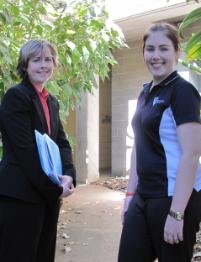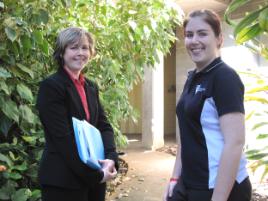Rachel fights back from MS, appreciates flexibility at work
Published on 02 June, 2011
Five years ago young Rachel Kerr was in the prime of her life and about to finish high school when her world was turned upside down.
At the young age of 17 Rachel began to lose her vision and went blind within a couple of weeks, and after testing at her local hospital and in Brisbane she was diagnosed with multiple sclerosis; a rare neurological condition which affects the brain and spinal cord.

Rachel Kerr (right) chats with Barbara Miller about workplace flexibility
World MS Day took place recently (May 25) with activities around the state. To get involved or find out more, visit http://www.msqld.org/ or view the campaign at www.youtube.com/user/MSAustraliaQ
Luckily Rachel's sight was restored within a few months and she now has most of her mobility back, apart from feeling occasional fatigue, aches and pains.
CQUniversity Director People and Culture Barbara Miller says the University is happy for Rachel to have flexibility in her job as a finance officer, so she can juggle work patterns around her health.
Rachel says she knew very little about the disease when she was first diagnosed.
"When I did some research, I realised that MS is most common in women aged 20 to 40 years old," she says.
Determined to maintain a normal life, Rachel made the decision to tell her employers about her MS early.
"I made sure that my colleagues knew about my MS from early on and fortunately I have never felt the need to hide or not disclose my condition to people."
"To be honest sometimes MS is a bit tricky to hide especially when I am reliant on a walking stick," she said.
Fortunately many people like Rachel are able to work for years after their MS diagnosis, but often give up work or lose their jobs. A simple greater understanding of MS would have enabled them to stay in employment.
"You do get the odd person who just doesn't understand the huge impact that MS can have on your work life, especially if you have an exacerbation," she said.
Now almost 22, Rachel is working part time and CQUniversity has been nothing but supportive of Rachel and her incurable chronic illness.
"I have a great network of co-workers and friends at the University who are very helpful and understanding - my MS has been controlled for some time now so most of the time I do not need much help," she said.
"Fortunately I have been very lucky with all of my employers who have made allowances and accommodated me - although I know I am in the minority."
"It's often small things like flexible working options, ad-hoc time off for hospital visits and minor workplace modifications are all a person needs to be able to work effectively and feel valued in the workplace," she said.
Rachel's story highlights the importance of the issue of employment retention, which is the theme of this year's World MS Day awareness campaign, MS Australia - QLD Advocacy Manager Natalie Walsh said.
"About 80 per cent of people with MS will lose their job within 10 years of diagnosis, often in their 30s or 40s, without adequate financial savings and with a very real risk of social isolation," Ms Walsh said.
"With a bit of flexibility and in many cases small changes in the workplace, which can be undertaken with Government assistance and grants, many people with MS can remain in employment. That's the message we hope to send this World MS Day."
MS is the most common chronic neurological condition affecting young adults, and the average age of diagnosis is just 30. There is no known cause or cure.


